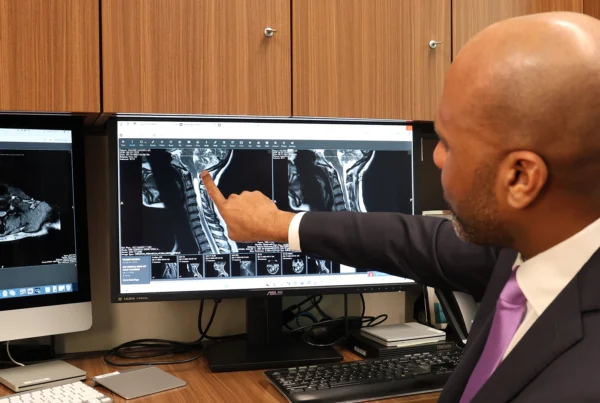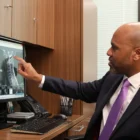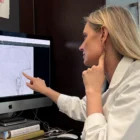Spinal tumors are not always easy to initially diagnose, since many of the symptoms can be indicative of a wide range of other maladies. Cancerous spinal tumors tend to develop very quickly, and noncancerous tumors can take weeks or more to develop. However, both can cause debilitating symptoms as they grow.
It isn’t always clear why some individuals may develop spinal tumors, although a history of cancer may certainly play a role. What is definitely known is that as the tumor grows, other spinal tumor symptoms may develop, resulting in you feeling more ill and hopefully causing you to go see a physician. It is important to note all the symptoms you may be feeling, as the more detailed you can be, the more your physician will be able to properly diagnose your condition or administer the correct tests based on your symptoms.
Spinal Tumors Symptoms
1. Pain in Your Back or Neck
Back pain can be caused any number of issues, and often disappears after a few days if it is simply a strained muscle. However, if your back pain does not dissipate, spreads to other areas of your body or grows more severe, it is time to see your physician. In order to help the doctor properly assess your back pain, make a note of the following details:
- Where does the pain radiate from, and how far does it spread?
- Has the back pain grown more severe over time?
- Does the pain grow worse in the evening?
- It is worse when you lie down?
- Does medication help?
- Does it feel worse when you cough or sneeze?
2. Muscle Weakness
Muscle weakness is another common spinal tumor symptom, and also a common symptom of many other illnesses. The weakness can affect different areas of the body, depending upon which areas and nerves in the spinal column the tumor is affecting.
If you experience weakness of the muscles in the arms or legs that grows progressively worse, you will definitely want to seek medical attention. You should also be concerned if you have difficulty walking or if you fall due to weakness in the legs.
3. A Loss of Feeling in Your Arms and Legs
A loss of sensation can occur in the arms and legs, and especially in the feet, hands, fingers and toes, as a result of the nerve damage caused by a spinal tumor. You might also feel coolness in these areas or sudden, sharp pain.
4. Loss of Control of Your Bodily Functions
It is always wise to consult your physician if you experience any problems in bladder or bowel function. Such issues can be as minimal as leaking urine or extreme as a complete loss of control of your bowels. Fecal and urinary incontinence can be indicative of many serious illnesses and conditions, and an indicator a spinal tumor symptom.
5. Increased Sensitivity to Heat and Cold
Another spinal tumors symptomYou may find that you are suddenly more sensitive to hot and cold temperatures, especially in the extremities.
It's time to get back
to doing what you love.
6. Odd Reflexes and Muscle Contractions
When a spinal tumor compresses nerves in the spine, it can cause you to suffer from involuntary and abnormal twitches, contractions of various muscles or muscle spasms.
7. Tenderness in the Back Along the Spine
As the spinal tumor grows, you may begin to feel tender along the area of the spine where the tumor is located. While this is of course not an enjoyable spinal tumor symptom, it may help the physician better pinpoint the location of the tumor.
8. Less Sensitivity to Pain
You might also find that some or all of your extremities have become less sensitive to touch and pain. A general numbness may be felt in some areas. This is a result of the spinal tumor compressing various nerves.
9. A Loss of Muscle Function
Losing muscle function is different than just a general weakness of the muscles. If you simply cannot get some of your extremities to work as they should, you are experiencing a loss of muscle function, typically caused by a compression of various nerves in the spine.
If you experience any of the above spinal tumor symptoms, especially more than one, then seek medical attention immediately.
Based on your symptoms, your surgeon may prescribe the following tests to see if it is a spinal tumor. Although an Xrays may be ordered initially, the only way to be certain that a spinal tumor is not present is to have an MRI performed.
If the physician finds that a spinal tumor is causing the issues, then early treatment can help to repair any damage and enable you to regain proper function of your nerves. Some procedures for removing spinal tumors can be performed with minimally invasiveness. The patient can usually go home the same day as this surgery if certain criteria are met. However, if you wait too long to seek diagnosis and treatment, permanent damage can occur. If you feel that you are experiencing spinal tumor symptoms, contact your physican.

About Dr. Michael G. Kaiser
Dr. Michael G. Kaiser is a nationally recognized neurosurgeon in North Jersey and is a proud member of Neurosurgeons of New Jersey, practicing out of their Ridgewood office conveniently located on East Ridgewood Avenue. Dr. Kaiser specializes in complex and minimally invasive spine surgeries.









